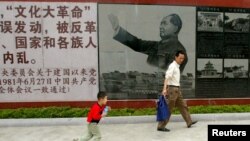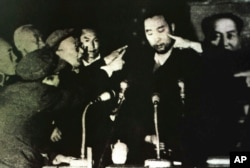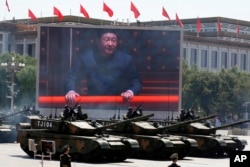A concert in Beijing’s Great Hall of the People by a group of young girls singing nothing but communist "red songs" has rekindled the debate in China over the legacy of the Cultural Revolution 50 years ago.
The teen group 56 Flowers – the name is a reference to China's 56 ethnic groups – featured classic socialist songs, such as the anthem of the Cultural Revolution, during the concert earlier this month, along with catchy tunes and lyrics like “socialism is good” and “Mao Zedong thought is the sun that forever shines.”
The singers praise President Xi Jinping and chant “down with American imperialism.”
Songs recall brutal tactics
Many people think the 56 Flowers repertory is an attempt to transform public attitudes about the Cultural Revolution, but one that actually accomplishes the opposite effect: the songs recall memories of brutal tactics inflicted on those who did not conform to the politics of the time.
The contrast between current times and China's upheavals half a century ago is seen as an embarrassment and mockery of today's authorities.
“Everything in China is shanzhai – the fake muckrake. Even the political propaganda this time also comes in as a shanzhai product. It’s hilarious,” said Wu'er Kaixi, a veteran dissident who had a prominent role during the Tiananmen Square political protests a quarter-century ago. He now lives in Taiwan.
Mao began the Cultural Revolution to solidify his power and reinforce what he considered ideological purity.
He rallied the youth to purge society of revisionist thinking. But the movement led to the deaths of millions of people, forced high school and university students out of school, and set back economic development. The Cultural Revolution only ended truly with Mao’s death in 1976.
Uncomfortable reminder
Li Datong was managing editor of Freezing Point, a weekly that reported on all aspects of contemporary life in China – until its 11-year run was shut down by authorities in 2006. He says 56 Flowers is an uncomfortable reminder of the excesses of the Cultural Revolution, a time when Li was sent away from Beijing to work for 10 years on herding chores in Inner Mongolia.
“Such performances send chills down the spines of those who had been through the Cultural Revolution. The backdrop [of their concert] looks just like the image portrayed during the Cultural Revolution era,” Li said. He calls the group a “clone” of the haunted past.
In an open letter issued in early May, Ma Xioli, the daughter of a former minister of labor, declared 56 Flowers represents a "resurgence" of the Cultural Revolution.
“For them to use this means to commemorate the 50th anniversary of the state of the Cultural Revolution is entirely in defiance of the political discipline of the party,” Ma wrote.
Citing Mao to extol President Xi, as 56 Flowers has done, deviates from the official line of political correctness, Li said. It holds that the Cultural Revolution was the outcome of dictatorial actions – by Mao, of course, although the Chinese revolutionary leader’s mistakes in the late 1960s have seldom been highlighted in public.
Unflattering light
Wu’er said the adulation that 56 Flowers has inspired, and the way the group's sponsors organized its concert, cast President Xi in an unflattering light.
“A group of conmen hijacked China's Theatrical House [to stage the concert] and then forged a statement issued by the Central Propaganda Department," he said. "That will make President Xi Jinping look ridiculous."
On May 6, four days after the concert, the China National Opera and Dance Drama Theater said its role as a sponsor of the musical evening was the result of assurances provided by one of the organizers, which turned out to be a fake.
The Beijing Xicheng Culture Committee, responsible for ratifying cultural events, said it had not approved the addition of the sponsor in question, although it had approved the concert plan, and promised to take disciplinary action.
Zhang Ming, a professor of political science at Renmin University of China, downplayed the sensation that 56 Flowers has triggered, and said there was no hidden political agenda behind the concert, just poor market judgment.
“It’s just a group of businessmen who wanted to take advantage of 'red market' opportunities, but they have messed up everything,” Zhang said.
Ticket sales
More than 10,000 tickets were sold for the concert, priced between $30 and $150 (200 to 1,000 yuan). Journalist Li said he suspected the government paid for the tickets and distributed them to civil servants.
On Weibo, the social-media site that is one of China's most popular outlets for public opinion, there were more dislikes than likes for 56 Flowers.
"You’re dressed like prisoners," one user wrote. "Who allowed you to represent the country?"
Hu Zhishen from Zhejiang province wrote on Weibo that the Great Hall of the People is the country’s most important venue for making policy.
“Singing red songs at such a sensitive place could not help but make one think this is a comeback of the Cultural Revolution," Hu wrote.
Others defended the group. “It’s not a sin to sing,” according to one comment posted on Weibo. Another admirer wrote that one of the negative results of the Cultural Revolution was "pinning labels on people,” and said that's what criticizers have done on 56 Flowers.
Although it remains unknown who promoted the group, and what their politics are, Li says it is clear that 56 Flowers could not have performed in the Great Hall of the People without some help from true political heavyweights.






